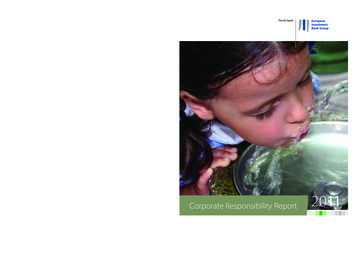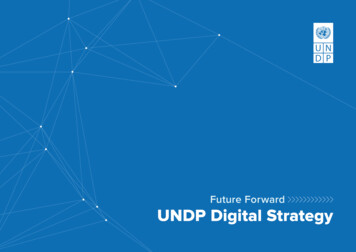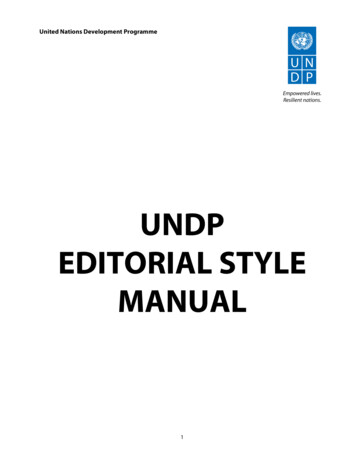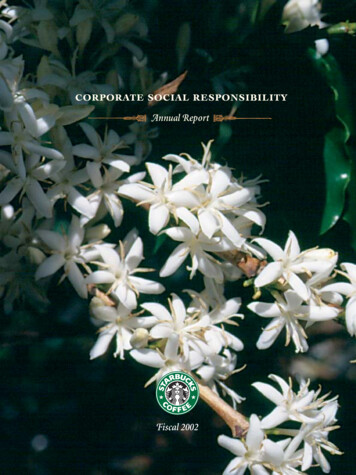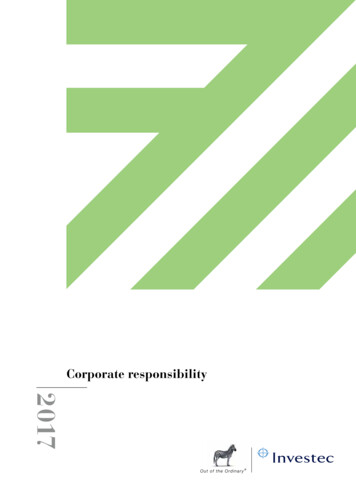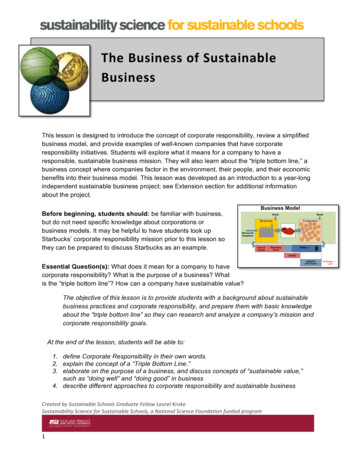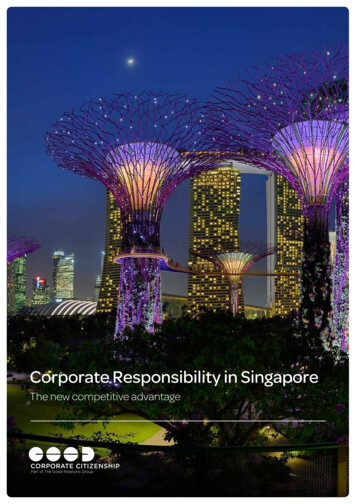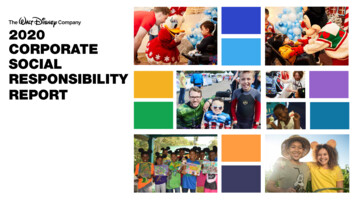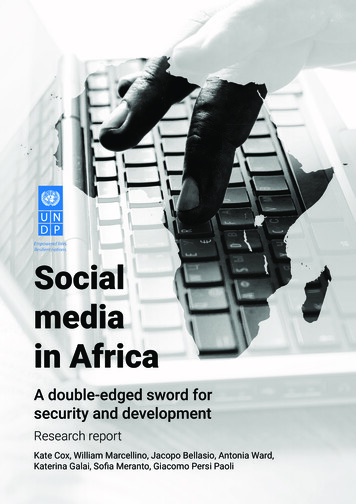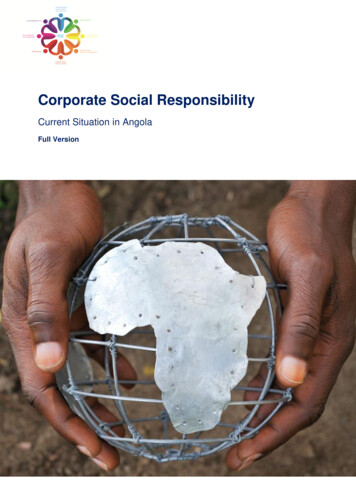
Transcription
Corporate Social ResponsibilityCurrent Situation in AngolaFull Version11 de Abril de 2013 2013 KPMG Advisory – Consultores de Gestão, S.A., a firma portuguesa membro da KPMGInternacional, uma cooperativa suíça. Todos os direitos reservados.
Corporate Social ResponsibilityCurrent Situation in AngolaThe present study was promoted by the United Nations Development Program (UNDP) andfinanced by the Spanish Agency for International Cooperation and Development (SAICD). It wasdeveloped by KPMG Angola - Audit, Tax, Advisory S.A. for the Corporate Responsibility WorkGroup in Angola.LuandaAngolaApril, 11th 20131
Corporate Social ResponsibilityCurrent Situation in AngolaContent Index1Executive Summary1.14Why the study?4Comparative Analysis with Angola’s HDI234551.2Methodological Approach71.3Main Conclusions81.4Sectoral Analysis10Background152.1What is Corporate Social Responsibility152.2The international context172.3The Angolan context20Characterization of the current situation of CSR in Angola443.1The Business Sector443.2The contribution of other agents in the CSR agenda61Risks, Challenges and Opportunities associated with CSR684.1Key opportunities684.2Key Challenges69The Future Path - CSR as a development tool735.1The answer to the challenges735.2Courses of action756Glossary787Methodological Approach827.1Companies Consultation827.2Other stakeholders consultation848Acronyms used869References / Bibliography8710 Case Studies88Figures Index2
Corporate Social ResponsibilityCurrent Situation in AngolaFig. 1 – Comparative Analysis of Angola’s HDI . 5Fig. 4 – Relevant Topics and e vectors of analysis . 8Fig. 5 – Positioning of analyzed sectors . 10Fig. 6 – Model of the Integrated Program to Combat Poverty and Rural Development . 27Fig. 7 – Most problematic factors for Conducting Business in Angola . 31Fig. 8 – Fatalities attributable to environmental causes . 40Fig. 9 – Risk matrix and preparedness for risk . 41Fig. 10 – Average distribution of CSR Budget by sector and area of operation . 613
Corporate Social ResponsibilityCurrent Situation in Angola11.1Executive SummaryWhy the study?The stability brought by the peace process set Angola into a clear path towards recovery, from acountry with difficulties and limitations in basic social conditions, to one of the most growingeconomies in Africa. When compared with other countries of Sub-Saharan Africa and othercountries with low Human Development Index (HDI), Angola is showing a progressive evolution.HDI is a metric to evaluate progress in the long term in the three basic dimensions of HumanDevelopment: long and healthy life expectancy, access to education and a decent standard oflife, and is used to provide a complementary perspective to more common indicators as GrossNational Product (GNP) per capita, which considers only the economic dimension ofdevelopment.1Despite of all positive signals, according to the report of Global Human Development in 2013the country is still far from the average value of the Human Development Index, currentlythoccupying the 148 position out of 187 countries, with and HDI of 0,508. The HDI of SubSaharan Africa as a region increased from 0,366 in 1980 to 0,475 (in 2013), positioning Angolaabove the regional average, and above the group of countries with low human development(with a HDI value of 0,466). In Sub-Saharan Africa, Angola’s nearby countries in terms ofranking in the HDI and population are Senegal and Zambia with a HDI ranking of 154 and 163respectively. The trends of the HDI show an important evolution, both at national and regionallevels, although highlighting significant gaps in quality of life and development opportunities.1The Global Human Development Report 2013 shows the values and rankings of the Human Development Index for187 countries and recognized territories by the United Nations. This edition also presents the HDI proportioned to theinequality of the (HDI) in 132 countries, the Index for Gender Inequality (IGI) for 148 countries, and the MultidimensionalPoverty Index (MPI) for 104 countries. The values and ranking published in the Human Development Report of 2013 arenot comparable with previous reports due to a change in database and calculation methods. In order to allow theprogress in the HDI, the report in 2013 includes the calculations since 1980 to 2012.4
Corporate Social ResponsibilityCurrent Situation in AngolaComparative Analysis with Angola’s HDIFig. 1 – Comparative Analysis of Angola’s HDI (Source: hdr.undp.org)Since 2000, Angola has showed improvements on its HDI and is currently placed just above ofthe HDI of the lower value in the world and of the HDI of Sub-Saharan Africa. Even so, still farfrom the world’s average.The following graph is based on indicators, methodology andconsistent temporary series, showing in this way, real changesin the values and evaluation in the long term, which reflects theactual progress made by the countries.Trends in the components of the index of the HDI ofThe value of HDI of Angola for2012 is 0,508 - in the category ofthe low human development positioning the country in the148th place out 187 countriesandAngola 2000-2012consideredterritories.Between 2000 and 2012, thevalueofHDIinAngolaincreased from 0,375 to 0,508,registering an variation of 35%(annualaverage growthof2,6%).Between 1980 and 2012, the lifeexpectancy in Angola increased0,3 years and the expectancyof school years increased to6,0 years. The Gross NationalIncome per capita of Angolaincreased 74% between 1985and 2012.Figure 2 – Evolution of HDI components in Angola (2000-2012, Source: hdr.undp.org)5
Corporate Social ResponsibilityCurrent Situation in AngolaIn addition to the role played by the Angolan Executive, contributing to the strong economicgrowth of Angola and for the improvement in HDI, there are also significant contributions bycompanies, non-governmental organizations (NGO's) and other entities. All of these entitieshave their own strategies and approaches to combat poverty, protect the environment andpromote sustainable development.In this context, the United Nations Development Program (UNDP) with the support of theSpanish Agency for Cooperation and Development (SAICD) considered relevant to conduct astudy to assess the current the state of Corporate Social Responsibility (CSR) in the country.On the other hand, while conducting this assessment of CSR practices, it expected that acommon ground between the different parties is established, that leads to effective cooperationbetween the government, businesses, NGOs and other partners around the Corporate SocialResponsibility in Angola. Therefore, only with a joint effort and unification of all entities it will bepossible and enhance human development in Angola.The following graphs present diverse perspectives of analysis on different dimensions whichcharacterize the development of societies and countries, namely others countries of SubSaharan Africa, such as South-Africa, Nigeria, Zambia and Ghana.GDP per Capita vs. HDI EducationGDP per Capita vs. HDI HealthHDI vs. Deplection of Natural ResourcesEducation Index vs. Adult Literacy IndexFigure 3-Comparative analysis of Angola’s development index (Source: hdr.undp.org)6
Corporate Social ResponsibilityCurrent Situation in AngolaIn all past analysis, Angola occupies an intermediate place in terms of development comparedto other African countries in Africa, either in health, education or natural resources depletion.Furthermore, Angola shows a positive value in the GDP per capita among the countries in SubSaharan Africa, strongly potentiated by the contribution of the oil sector. Hence, despite lowdevelopment mirrored from the analysis of these indicators, the wealth of the country,materialized by the GDP per capita has placed Angola in advantageous position face itscounterparts in terms of potential growth.The index of macro-economic development of Angola enabled the Political Committee forDevelopment (PCD) of the United Nations Economic and Social Counsel (UNESC) to considerAngola as eligible to migrate from the list of the Less Advanced Countries (LAC) to countrieswith average income from 2015, confirming Angola’s potential development and economicgrowth.1.2Methodological ApproachMarket AnalysisFor the development of the Corporate Social Responsibility study, several public and privatecompanies with representations in the Angolan market were analyzed, in terms of the volume ofbusiness, in nine sectors and distinct activities, ending in a sample of 100 companies selected.The development of the study started with a benchmark analysis of public information availableregarding corporate social responsibility practices, in Angola. The sources of information usedwere institutional websites and public reports publicized by the organizations, in terms ofcorporate social responsibility or other available material referring to this type of information.From the benchmark analysis, it was possible toidentify a set of relevant themes which reflect thedifferent areas of corporate performance in terms ofCorporate Social Responsibility in Angola. Suchareas of performance were combined into threedimensions of analysis: social, economic andenvironmental dimensions. The allocation of themesin these three dimensions was based on thealignment of the pillars of sustainable developmentwhich benefits the equilibrium between economicgrowth, social promotion and mmunicationsTransportsEnergy&WaterMining IndustryBeveragesRetailFinanceOil & GasDiverseTotalnr Companies1288394831161100Table 1 – Nr of companies analyzedby sector7
Corporate Social ResponsibilityCurrent Situation in AngolaDefinition of the vectors of analysisThe relevant themes were achieved through a bibliographical research conducted in referenceto documents in the area of corporate social responsibility and from documents which describeAngola’s social, economic and environmental context.Fig. 2 – Relevant topics and e vectors of analysis (Source: KPMG Analysis)Stakeholders Consultation and QuestionnaireAccording to the vectors of analysis, a questionnaire was developed regarding CSR practicesand made available to 77 companies from the sectors with more representation in the Angolamarket. The rate of response was 30%. Due to response rates it was only possible to analyzethe results for the Oil and Gas, Construction, Banking and Transports sectors in an independentway.Other responses were combined in an aggregated group (“other sectors”) which comprises theresponses from companies from sectors such as: Insurance, Telecommunications, Mining,Beverages, Infrastructure and Agro–industry.In addition, more than 20 face-to-face interviews with companies and 14 interviews withministries and different entities of the civil society (among universities, development agenciesand NGOs) were conducted.1.3Main ConclusionsDistinct levels of maturity in business performanceIt can be observed that there exists a considerable maturity breakdown between the practices ofcorporate social responsibility of companies from the different sectors analyzed and also inside8
Corporate Social ResponsibilityCurrent Situation in Angolaeach sector. In sectors such as Oil and Gas, it can be observed that there is an accentuatedmaturity in the management of corporate social responsibility themes. In the case ofinternational companies within this sector with operations in Angola, the design of a localstrategy can be observed, aligned with international strategy. It is evident the existence of ahigh level of understanding and experience in the implementation of projects in the socialsphere which is transversal to the majority of companies operating within the sector.In the others sectors such homogeneity cannot be observed. Certain companies are assuming aleading position while others act as followers, not displaying the same degree of involvementand maturity of communication of CSR practices. This conclusion is partially supported by thelow adherence demonstrated in the participation in this study in certain sectors.In general, a positive evolution of the social responsibility paradigm can be verified. Theperspective of assistance and charity, for example, through donations or construction ofinfrastructure is outdated. Companies are increasingly focused in developing integrated projectsthat essentially focus on people development and economic growth, through training andcapacitation of people to identify and work on opportunities to overcome poverty.The external communication developed by the companies is not efficient, making it difficult forstakeholders to access information regarding the initiatives developed.Education and Health are the areas where companies are keener to investIt was found that there is a considerable alignment ofpractices with the themes identified as the most relevant andthat reflect the social, economic and environmental contextof Angola. Education and Health are the areas where mostinitiatives are developed with particular emphasis on theinitiatives related with alphabetization and schooling,retention and academic success, and also, training andpromotion of workers health and safety.39%ofsocialinvestments in CSR arein the area of Education3%ofsocialinvestments in CSR arein initiatives specificallytarget to the youthIn the social scope, the promotion of equality betweengenders and the initiatives directed specifically to the youth are the areas with less investmentfrom companies.The least frequently mentioned initiatives (mentioned by less than 40% of the companies) withinCSR activities that were consulted were: training of health professionals, information technologycapacity, youth access to culture, financial literacy, promotion of national languages, promotionof woman’s culture, support of mine-clearing operations, development of infrastructure (housingand energy), environmental awareness of partners and the support of war veterans.The existence of these areas denotes that, despite the alignment of the companies with relevanttopics, there are still aspects which have been less explored and supported and can beincentivized in a logic of promoting government goals and market differentiation of companiesthrough their CSR strategies.The environmental liability mainly as a response to legal requirements9
Corporate Social ResponsibilityCurrent Situation in AngolaThe recent legal and environmental regulatory context createdThe environmental areain Angola, induces a reduced pro-activity from companies inrepresents only 7% ofpromoting environmental protection. The basic populationinvestments in CSRneeds, at a social level, to make environmental investmentsand efforts seem secondary. The current challenge, in thescope of environmental responsibility, is essentially related with the commitment with legalcompliance and regulatory frameworks, for example developing environmental impact studiesand ensuring proper compensatory measures.Challenges and future pathThe main challenges pointed out by companies are related with the lack of strategic guidelinesand knowledge, know-how to define CSR projects, identifying trustworthy partners for thedevelopment of initiatives, and the tools to measure the impact in the communities and returnthe social investments. The communication reinforcement occurs as a way to promote theexchange of practices, experiences, competences and the possibility to identify synergiesbetween partners and as a mechanism to promote participation from all companies and thewidening of the spectrum of partners for projects development.According to the areas of investment, despite the existent alignment with areas with more needsin the Angolan society, the strategic approach of the initiatives should be reinforced in a waythat enables such initiatives to be even more aligned with the business, in order to ensure itssustainability and the existence of internal competences for the implementation andaccompaniment of the projects.On the other hand, the Executive position lacks leadership and cooperation with the differententities involved, in order to generate mutual trust and capacity that can be translated in adefinition of a clear and transparent CSR agenda.1.4Sector AnalysisFrom the information gathered, the different sectors were analyzed in terms of their maturity ofCSR practices, focusing on themes such as: The existence of a structured corporate social responsibility strategy;Existence of specific internal competences to manage these issues;Number and relevance in the areas of intervention;Alignment with the international principles of reference.On the other hand, the practices of external communication were also analyzed, namely theexistence of information related with corporate social responsibility practices, through thepercentage of companies from each sector that publicly disclose information about theircorporate social responsibilitypractices.Leader sectorsThe leader’s have the abilityto make the most of their10Figure 3 – Positioning of analyzed sectors (Source: KPMG Analysis)
Corporate Social ResponsibilityCurrent Situation in AngolaCSR practices, through active and transparent communication. They display a strong alignmentwith the relevant issues within the context of Angolan society and with the United Nations GlobalCompact Principles. The CSR governance model is normally centered in the Communication,Marketing and Social Responsibility departments. Such departments have demonstratedknowledge and specific competences for the definition of CSR strategies and to ensure itseffective implementation; they exchange efforts and support other partners with recognizedknow-how on these matters, such as international development agencies and NGOs. In terms ofcommunication, they publish specific reports about the CSR practices for different stakeholdersand are transparent in the communication that they publish in their website.Conservative sectorsThey have a considerable degree of maturity in the practices, they develop and define areas ofintervention that are aligned with stakeholders expectations and with material issues, howeverassuming a conservative attitude in respect to communication. They have an aligned strategywith the CSR goals that are defined in function of local context.Opportunist sectorsThe organizations that fall under this category are those that take more risks of overseeing theirstrategies and compromises in CSR associated on its majority to practices of communicationfocused on publicity, brand notoriety and investment in advertisement. Such practices ofcommunication are commonly defined as “Green washing “or “Social washing” and causesperception distrust from the different interested parties involved in the projects of CSR andsociety in general. The issues addressed may not be totally significant for society and do notensure total alignment with the Global Compact principles. The companies with an opportunistprofile are focused on communicating results, taking advantage to reach efficiently itsstakeholders and positioning themselves as socially responsible through aggressive andpersistent communication. The risks are incremented with increasing scrutiny from its investors,clients and competitors.Followers sectorsThe companies which represent this group of sectors do not show reports or practices ofsystematic communication about the activities developed under CSR scope. Theimplementation of its strategies is supported on its majority in autonomous structures, such as:institutions and nongovernmental associations in order to develop social responsibility projects.There is a partial alignment with the principles of Global Compact and material issues are notaddressed. Typically, companies which represent such sectors have a reactive attitude todevelopment of CSR projects and the projects they develop are less integrated on its strategiesand business goals.The profiles of action on CSR of business sectors in AngolaThe Oil and Gas sector is where this issues display more maturity and where the positioning ismost uniform in the company’s analyzed. Usually in the companies of this sector there exists adepartment of social responsibility or sustainability which, in conjunction with other areas andthe Board define and implements a strategy of corporate social responsibility. They are globallyaligned with the 10 principles of Global Compact. The areas of action are diverse in terms of therelevance of issues and in terms of geography. In terms of communication there are already11
Corporate Social ResponsibilityCurrent Situation in Angolasome practices of communication and report although not yet transversal to all companieswithin this sector, but in which there is still potential to capitalize.Oil and Gas Sector– Key facts 100% of the companies analyzed state that they are aware of and assure compliance with the principles ofGlobal Compact. 100% of the companies analyzed have a department of sustainability or Corporate Social Responsibility tolead these issues. It is the sector that most invests in corporate social responsibility activities, in part because of the legal andcontractual framework. Areas of greater investment are Education (on average 40% of the CSR budget) and Health 22%. The CSR initiatives that are more transversal to the sector are the fight against HIV/AIDS and trainingprograms for employees.The Construction sector is in a less mature stage than Oil and Gas sectors. Despite a wideparticipation in terms of areas of action and having demonstrated practices of communicationand alignment with the principles of Global Compact, it can be seen a considerable dispersionbetween companies within this sector, thus reflecting in general in a less consistent evaluation.On the other hand, most of the companies analyzed still not have a strategic framework relativeto the initiatives of social responsibility, reflected in the percentage of companies in this sectorwhich declare not yet to have a CSR strategy. On the other hand, these issues are stillassociated in the organization to areas of communication and marketing, and consequently lessintegrated in management practices and business of companies.Construction sector – Key facts 75% of the companies analyzed state to be fully aware and aligned with the Global Compact Principles.50% of the companies’ analyzed have a Sustainability or Corporate Social Responsibility department to leadthese issues.The areas where investment is higher are education (on average 54% of the budget of the CSR) and health(26 %).The CSR initiatives that are more transversal to the sector are health programs for employees, programs fortraining and promotion of youth employment (developed by 100% of the surveyed companies), and also tostimulate the local economy.In the Banking sector, which is aligned in terms of maturity with the construction sector,corporate social responsibility issues are typically under Communication and Marketingdepartments or are dealt by foundations that implement the strategy outlined. There is a partialalignment with the principles of Global Compact and almost total alignment with relevant issues.12
Corporate Social ResponsibilityCurrent Situation in AngolaBanking sector – Key facts 33% of the companies in the sector state to be aware and ensure compliance with the Global Compactprinciples. The remaining declares that they partially know these principles. 33% of the companies in this sector have a Sustainability or Corporate Social Responsibility Department tolead these issues. The CSR initiatives that are more transversal to the sector are initiatives related with training and health ofemployees. For the community they reveal to make a strong investment in culture. All companies analyzedrefer to promote transparency and ethics in way they conduct of business.The Transportation sector presents less maturity in the definition of a CSR strategy; in manycases the responsibility for these topics is not formally attributed in the organizational structure.The initiatives do not yet cover all the issues and do not reflect the stakeholder’s expectations.The communication that is made of initiatives undertaken is also still very incipient.13
Corporate Social ResponsibilityCurrent Situation in AngolaTransport sector–Key facts Companies surveyed refer to know part of the principles of the Global Compact. Companies surveyed do not have an area or specific department for corporate social responsibility orsustainability. The initiatives undertaken by all companies in the sample are related to education, literacy and promotingmaternal health. The areas of greater investment are education, health, culture, environment and economic development(represent approximately 14% of the budget for CSR by companies in the sector).Note that relatively to “other sectors”, for which the analysis was not developed in adisaggregated way due to lack of representation (composed by companies in sectors such as:Telecommunications, Beverages, Insurance, Mining, Infrastructure and Agro-industry) it can beverified that, in average, there is already significant level of maturity and significant practices ofcorporate social responsibility. In these sectors there is, however, a considerable disparityamong companies and sectors which they represent, in regards to the maturity of the CSRpractices. In general, the communication in these organizations is also still very incipient.14
Corporate Social ResponsibilityCurrent Situation in Angola2Background2.1What is Corporate Social ResponsibilityAlthough the concept is being developed since the 70s, there is not a single definitionuniversally accepted. However there is a consensus that it results from a balance and equitableconcern between the three fundamental dimensions of economic development, social promotionand environmental preservation. In this sense, the concept is based on the followingassumptions: Responsible management towards the employees - An adequate corporate governanceshould be ensured, transparent and with ethical principles, as well as conditions andlabour rights for the employees, training and development opportunities;Engagement with internal and external stakeholders - maintain a close and cooperatingdialogue with key stakeholder groups, listening to their main expectations;Economic development at a local and national level – Promotion of economicdevelopment through hiring of local labor, selection of local suppliers and generation ofbusiness of support;Commitment to the society in which it operates – Primarily develop projects with highsocial return and impact;Respect in the use of natural resources and minimization of impacts - creatingawareness of the impact that businesses have on the use of natural resources, eitherby degradation or unsustainable use.The integrated approach of these aspects necessarily makes the companies’ managementmore responsible, with a holistic view of the main risks and opportunities at a social, economicand environmental level.The World Business Council for Sustainable Development(WBCSD) defines CSR as "the commitment of business tocontribute to a sustainable economic development whileincreasing the quality of life of its employees and their families,as well as the community and society in general".The European Commission defines Corporate SocialResponsibility as "the companies’ responsibility for theirimpacts on society, and the development of a process tointegrate social, ethical, human rights considerations andconsumer concerns into business strategy and operations".From the perspective of the United Nations, the concept of CSRcan be interpreted in the light of the principles of the GlobalCompact. (See box)What are the Principlesof the Global Compact?The Global Compact principles,defined by the United Nations,challenge companies to accept,support and implement, withintheir sphere of influence, a set ofcore values in the areas ofhumanrights,laborstandards, environment andanti-corruption.Perceived as a mechanism for social progress, CSR helps companies to achieve theirresponsibilities as global citizens and adapt to a changing world, and should not be confusedwith the moral ethical duty, charity or mere philanthropy.15
Corporate Social ResponsibilityCurrent Situation in AngolaThe challenge of Corporate Social ResponsibilityCSR is on the agenda at national and international level, and the social, economic andenvironmental challenges that affect the developing countries have a direct impact on thecompetitiveness’ capacity of companies in position themselves in a global market withoutborders. In this chapter, Angola and Angolan companies have the opportunity to enhance theirimage in terms of human rights issues, working and labor practices and environmentalpreservation. Simultaneously, the Angolan companies are increasingly assuming an activestance as investors in international markets, already accounting for significant investments incorporations outside of Angola. This reinforces the need for Angola to assume its role incorporate social responsibility.In Angola, the pressures for a sustained and sustainable development poses challenges forwhich companies need to build a structured and consistent response. Economy’s diversification,the need for training and specialization of human resources, development and construction ofinfrastructures, the development of legislation, the increasing pressure from customers, accessto resourc
Corporate Social Responsibility Current Situation in Angola 1 The present study was promoted by the United Nations Development Program (UNDP) and financed by the Spanish Agency for International Cooperation and Development (SAICD). It was developed by KPMG Angola - Audit, Tax, Advisory S.A. for the C
